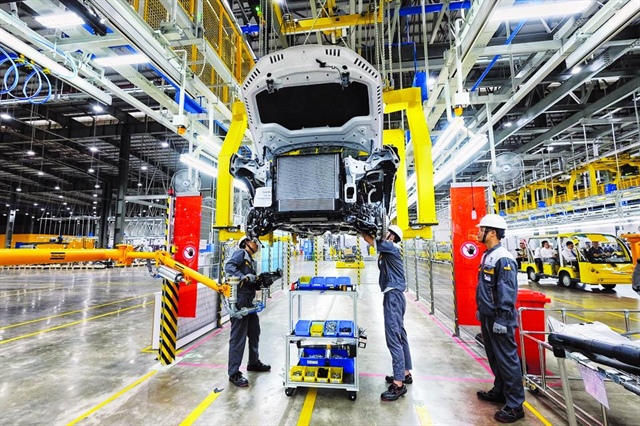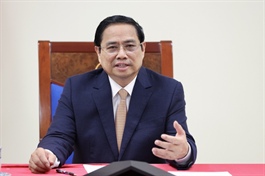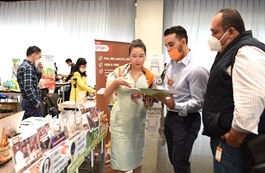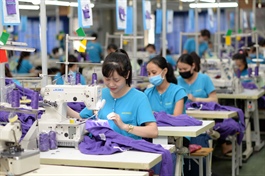HSBC revises up Vietnam’s GDP growth forecast to 6.9% in 2022
HSBC revises up Vietnam’s GDP growth forecast to 6.9% in 2022
Vietnam saw an 11-year-high growth rate of 7.7% y-o-y in Q2/2022, largely reaping the benefits of re-opening tailwinds.
HSBC has revised up Vietnam’s GDP growth forecast to 6.9% from the previous 6.6%, making it among the top performers in the region.

Car production at Vinfast's manufacturing plant. Photo: Pham Hung/ The Hanoi Times |
After two-quarters of sustainable re-openings, Vietnam’s recovery continues to be strong. The country’s second-quarter GDP growth hit 7.7% year-on-year, beating market expectations.
“This represents the highest growth Vietnam has seen in a quarterly GDP print since 2011, thanks to strong broad-based recovery across sectors,” noted HSBC in its latest report.
Thanks to removals of major local curbs and border restrictions in mid-March, travel-related sectors, particularly transportation and accommodation, have started to see meaningful revivals, stated HSBC.
Meanwhile, retail sales overshot 17% year-on-year in the second quarter, signaling a return of rebounding household consumption. Indeed, part of the success was attributed to a gradual recovery in the local labor market. The unemployment rate dropped to 2.3% in the second quảter, while employment continued to expand close to its pre-pandemic levels.
Tourism is also making headway as the summer season approaches. In the April-June period, Vietnam welcomed 500,000 visitors, almost five times more than those in the previous one, taking total tourists to 600,000 in the first half of the year. Before the pandemic, 80% of tourists came from Asia, topped by those from mainland China (32%) and South Korea (24%). Now, only 65% of tourists are from the region. European (16%) and the US (11%) tourists have accounted for a large chunk of tourists post-pandemic, right after South Korea (18%). The Vietnam National Administration of Tourism (VNAT) set an ambitious target of five million foreign tourists in 2022, a little shy of 30% of 2019’s level.
Aside from recovering domestic demand, Vietnam’s manufacturing has proved to be in a league of its own. All signs are pointing in the same direction of firm manufacturing growth. Albeit partly due to favorable base effects, industrial production (IP) growth accelerated to over 25% y-o-y in the second quarter.
Export growth hit an impressive pace of over 20% year-on-year in the period, a third of which came from firm computer and smartphone shipments. However, it is more than that: textiles and footwear, as well as machinery, all registered decent growth, indicating that Vietnam’s external engine is roaring again, stated HSBC.
Another bright spot came from the consistent FDI inflows, which reflect investors’ unwavering interests and confidence in Vietnam’s sound fundamentals.
High energy prices pose risks to growth
According to HSBC, even though price pressures are not as acute as in regional peers, for now, inflation momentum is rising rapidly. Headline inflation rose 0.7% month-on-month, translating into 3.4% year-on-year. Similar to previous months, high transport inflation remains the primary driver, rising 3.6% month-on-month. Indeed, domestic petrol prices continue to be adjusted upwards, jumping to record high levels.
In response, the government sought to cut taxes on petrol to alleviate some of the pressure, as taxes and fees account for around 35% of gasoline prices. Since 1 April, the environment tax was cut to VND2,000 for gasoline and VND700-1,000 for other fuels, which is expected to run through 2022. In early June, the Ministry of Finance (MoF) proposed to further cut it to VND500- 1,000, which is expected to take effect in early August. But this may not be the end. The MoF also signaled that it is considering reducing special consumption tax (8-10%), and VAT (10%), but this requires approval from the National Assembly, whose upcoming session is scheduled for October.
While high energy prices are largely expected, it was not the same for food inflation with an increase of 0.8% month-on-month. It largely reflects the strong pass-through of elevated energy costs on food inflation, as there is a broad-based price increase across items including meat, egg, and vegetables, based on data from the General Statistics Office (GSO).
Moreover, there are signs that inflation has started to broaden out. Core inflation recovered to 2.0% year-on-year for the first time in almost two years, as domestic demand continues to gain traction. Given elevated global oil prices, HSBC expected upward pressures on inflation to persist.
While the report forecast 2022 inflation to average 3.5% – still below the State Bank of Vietnam’s (SBV) 4% inflation ceiling – price pressures will become stronger in the second half, it noted.
Based on its inflation forecasts, inflation will likely overshoot 4% from the fourth quarter of 2022 to the second quarter of 2023, increasingly calling for the SBV to start its monetary normalization, HSBC suggested.

















